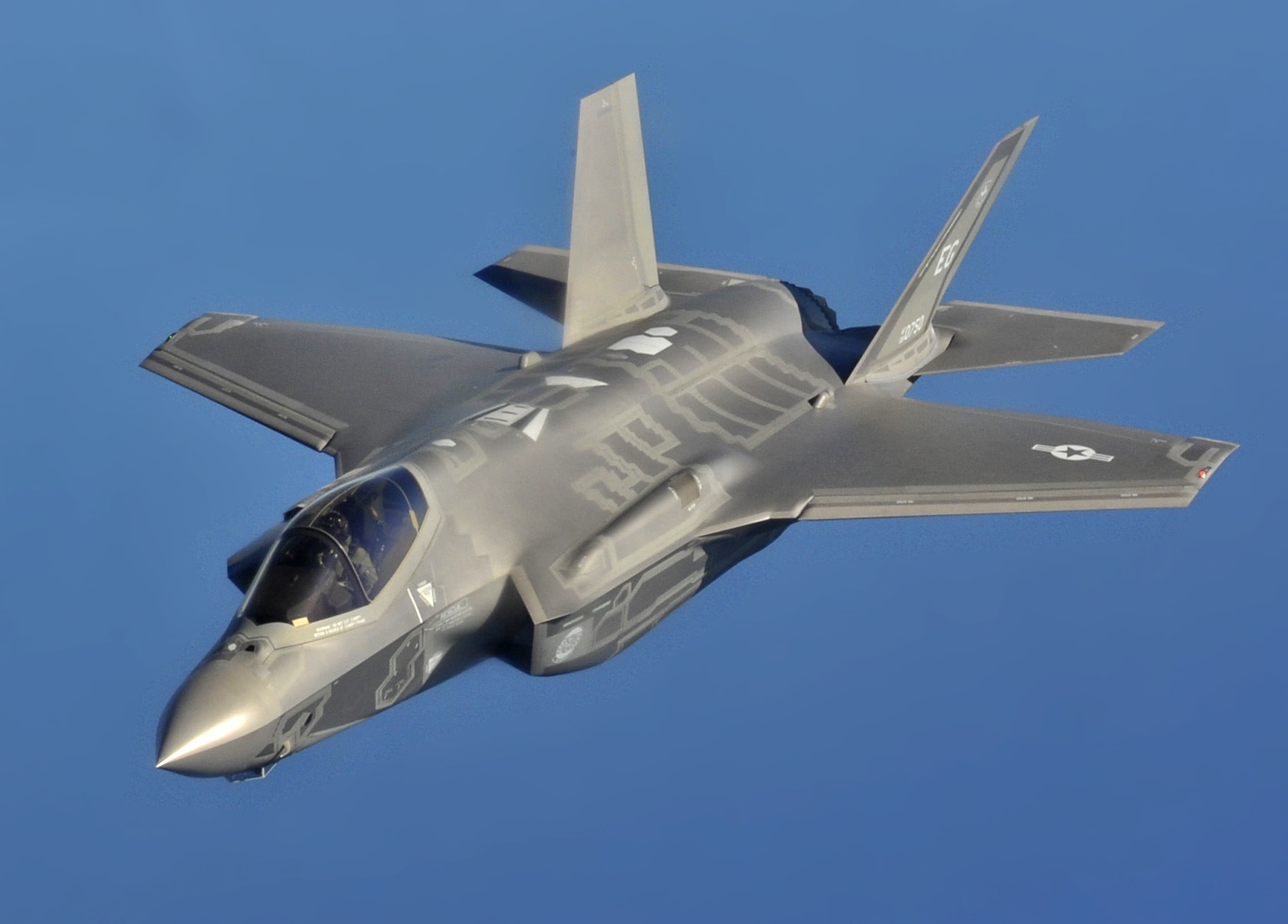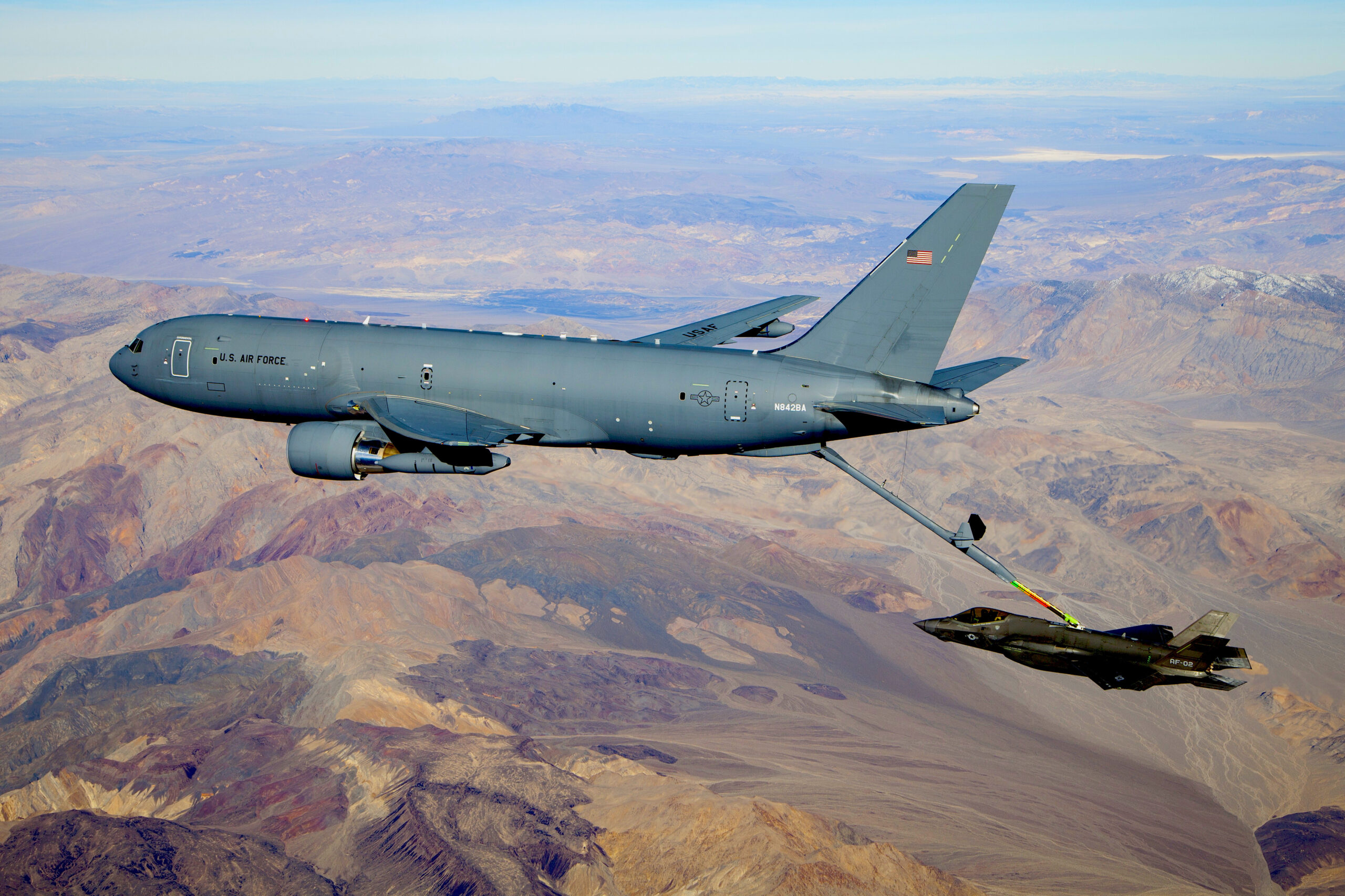William J. Astore provides a tour of some major weapons systems that should be on the scrap heap, and a rare case of one that finally is.

An F-35 training simulator at Eglin Air Force Base, Florida. (Lockheed Martin)
By William J. Astore
TomDispatch.com
 Cancel culture is a common, almost viral, term in political and social discourse these days. Basically, somebody expresses views considered to be outrageous or vile or racist or otherwise insensitive and inappropriate. In response, that person is “canceled,” perhaps losing a job or otherwise sidelined and silenced. In being de-platformed by Twitter, Facebook, and other social media sites, for instance, this country’s previous president has, it could be argued, been canceled — at least by polite society. More than a few might add, good riddance.
Cancel culture is a common, almost viral, term in political and social discourse these days. Basically, somebody expresses views considered to be outrageous or vile or racist or otherwise insensitive and inappropriate. In response, that person is “canceled,” perhaps losing a job or otherwise sidelined and silenced. In being de-platformed by Twitter, Facebook, and other social media sites, for instance, this country’s previous president has, it could be argued, been canceled — at least by polite society. More than a few might add, good riddance.
Cancel culture is all around us, with a single glaring exception: the U.S. military. No matter how poorly a major weapons system performs, no matter how much it goes over budget, no matter how long it takes to field, it almost never gets canceled. As a corollary to this, no matter how poorly a general performs in one of our twenty-first-century wars, no matter his lack of victories or failure to achieve mission objectives, he almost never gets cashiered, demoted, or even criticized. A similar thing could be said of America’s twenty-first-century wars themselves. They are disasters that simply never get canceled. They just go on and on and on.
Is it any surprise, then, that a system which seems to eternally reward failure consistently produces it as well? After all, if cancel culture should apply anywhere, it would be to faulty multibillion-dollar weapons systems and more than a few generals, who instead either get booted upstairs to staff positions or retire comfortably onto the boards of directors of major weapons companies.
Let’s take a closer look at several major weapons systems that are begging to be canceled — and a rare case of one that finally was.
* The F-35 stealth fighter: I’ve written extensively on the F-35 over the years. Produced by Lockheed Martin, the plane was at one point seven years behind schedule and $163 billion over budget. Nonetheless, the U.S. military persisted and it is now nearing full production at a projected total cost of $1.7 trillion by the year 2070. Even so, nagging problems persist, including engine difficulties and serious maintenance deficiencies. Even more troubling: the plane often can’t be cleared for flying if lightning is anywhere in the area, which is deeply ironic, given that it’s called the Lightning II. Let’s hope that there are no thunderstorms in the next war.

F-35A Lightning II fighter jet. (U.S. Air Force, Donald R. Allen)
* The Boeing KC-46 tanker: A tanker is basically a flying gas station, air-to-air refueling being something the Air Force mastered half a century ago. Never underestimate the military’s ability to produce new problems while pursuing more advanced technology, however. Doing away with old-fashioned windows and an actual airman as a “boom operator” in the refueling loop (as in a legacy tanker like the KC-135), the KC-46 uses a largely automated refueling system via video. Attractive in theory, that system has yet to work reliably in practice. (Maybe, it will, however, by the year 2024, the Air Force now says.) And what good is a tanker that isn’t assured of actually transferring fuel in mid-air and turns out to be compromised as well by its own fuel leaks? The Air Force is now speaking of “repurposing” its new generation of tankers for missions other than refueling. That’s like me saying that I’m repurposing my boat as an anchor since it happened to spring a leak and sink to the bottom of the lake.

A KC-46A connects with an F-35A Lightning II over California, January. 2019. (U.S. Air Force, Ethan Wagner, Wikimedia Commons)
* And speaking of boats, perhaps you won’t be surprised to learn that the Navy has had serious problems of its own with its most recent Gerald R. Ford-class aircraft carriers. That service started building carriers in the 1920s, so one might imagine that, by now, the brass had gained some mastery of the process of updating them and building new ones. But never underestimate the allure of cramming unproven and expensive technologies for “next generation” success on board such vessels. Include among them, when it comes to the Ford-class carriers, elevators for raising munitions that notoriously don’t operate well and a catapult system for launching planes from the deck (known as the Electromagnetic Aircraft Launch System or EMALS) that’s constantly breaking down. As you might imagine, not much can happen on an aircraft carrier when you can’t load munitions or launch planes effectively. Each new Ford-class carrier costs in the neighborhood of $14 billion, yet despite all that money, it simply “isn’t very good at actually being a carrier,” as an article in Popular Mechanics magazine bluntly put it recently. Think of it as the KC-46 of the seas.

The USS Gerald R. Ford aircraft carrier pulls alongside a replenishment oiler in the Atlantic Ocean, May 15, 2020. (U.S. Navy, Ruben Reed)
* And speaking of failing ships, let’s not forget the Navy’s Littoral Combat Ships (LCS), which have earned the nickname “little crappy ships.” A serious propulsion design flaw may end up turning them into “floating garbage piles,” defense journalist Jared Keller recently concluded. The Navy bought 10 of them for roughly half a billion dollars each, with future orders currently on hold. Lockheed Martin is the lead contractor, the same one responsible for the wildly profligate (and profitable) F-35.

Littoral combat ship USS Freedom during commissioning ceremony at Veterans Park in Milwaukee, Wisconsin, November 2018. (U.S. Navy, Katherine Boeder)
* Grimly for the Navy, problems were so severe with its Zumwalt-class of stealth destroyers that the program was actually canceled after only three ships had been built. (The Navy initially planned to build 32 of them.) Critiqued as a vessel in search of a mission, the Zumwalt-class was also bedeviled by problems with its radar and main armament. In total, the Navy spent $22 billion on a failed “next generation” concept whose cancelation offers us that utter rarity of our moment: a weapon so visibly terrible that even the military-industrial complex couldn’t continue to justify it.
Chief of Naval Operations Admiral Michael Gilday has gone on record as rejecting the idea of integrating exotic, largely untried and untested technologies into new ship designs (known in the biz as “concurrent development”). Godspeed, admiral!

Chief of Naval Operations Adm. Mike Gilday, left, visits the littoral combat ship USS Detroit in Mayport, Florida, September 2019. (U.S. Navy, Nick Brown)
Much like the troubled F-35 and the Littoral Combat Ship, the Zumwalt’s spiraling costs were due in part to the Pentagon’s fixation on integrating just such “leading-edge” technologies into designs that themselves were in flux. (Not for nothing do military wags refer to them as bleeding edge technologies.) Such wildly ambitious concurrent development, rather than saving time and money, tends to waste plenty of both, leading to ultra-expensive less-than-fully effective weapons like the Zumwalt, the original version of which had a particularly inglorious breakdown while passing through (or rather not passing through) the Panama Canal in November 2016.
Given such expensive failures, you might be forgiven for wondering whether, in the twenty-first century, while fighting never-ending disastrous wars across significant parts of the planet, America’s military isn’t also actively working to disarm itself. Seriously, if we’re truly talking about weapons that are vital to national defense, failure shouldn’t be an option, but far too often it is.

Guided-missile destroyer USS Zumwalt arriving at Naval Station Newport on Sept. 8, 2016. (U.S. Navy, James E. Foehl)
With this dubious record, one might imagine the next class of Navy vessel could very well be named for Philip Francis Queeg, the disturbed and incompetent ship captain of novelist Herman Wouk’s The Caine Mutiny. It’s also quite possible that the Pentagon’s next advanced fighter jet will fulfill former Martin Marietta CEO Norman Augustine’s estimate from the 1980s that, by the year 2054, the entire Pentagon budget would be needed to buy one — and only one – combat aircraft. Perhaps a Death Star for America’s new Space Force?
Is It Even Possible to Cancel a Major Weapons System Like the F-35?
The Navy’s Zumwalt-class of destroyers was such a disaster that the program was indeed canceled a mere $22 billion along the line, but what about a program like the F-35? Is it even possible to cancel such a behemoth of a weapons system?
That question was put to me by Christian Sorensen, author of Understanding the War Industry, who like me is a member of the Eisenhower Media Network. Overpriced and underperforming weapons, Sorensen noted, are a feature of, rather than some sort of bug in, the military-industrial complex as future profits for giant weapons companies drive design and fielding decisions, not capability, efficiency, or even need. He’s right, of course. There may even be a perverse incentive within the system to build flawed weapons, since there’s so much money to be made in troubleshooting and “fixing” those flaws. Meanwhile, the F-35, like America’s leading financial institutions in the 2007-2009 Great Recession, is treated as if it were too big to fail. And perhaps it is.
Jobs, profits, influence, and foreign trade are all involved here, so much so that mediocre (or worse) performance is judged acceptable, if only to keep the money flowing and the production lines rolling. And as it happens, the Air Force really has no obvious alternative to the F-35. During the 1950s and 1960s, the aerospace industry used to build a wealth of models: the “century series” of fighters, from the F-100 through the F106. (The notorious F-111 was an early version of the F-35.) The Air Force could also tap Navy designs like for the F-4 Phantom. Now, it’s essentially the F-35 or bust.
In its obvious desperation, that service is turning to older designs like the F-15 Eagle (circa 1970) and the F-117 Stealth Fighter (circa 1980) to bridge the gap created by delays and cost overruns in the F-35 program. Five decades after its initial flight, it’s something of a miracle that the F-15 is still being produced — and, of course, an obvious indictment of the soaring costs and inadequate performance of its replacements.

U.S. Air Force pilot waits in the cockpit of an F-35 Lightning II. (U.S. Air Force, Christopher Callaway)
The exorbitant pricing of the F-35, as well as the F-22 Raptor, has recently even driven top Air Force officials to propose the creation of an entirely new “low cost” fighter. Irony of ironies, once upon a time in another universe, the F-35 was supposed to be the low-cost replacement for “fourth-generation” F-15s and F-16s. Last month, current Air Force Chief of Staff General Charles “CQ” Brown exhibited the usual convoluted and nonsensical logic of the military-industrial complex when he discussed that new dream fighter:
“If we have the capability to do something even more capable [than the F-16] for cheaper and faster, why not? Let’s not just buy off the shelf, let’s actually take a look at something else out there that we can build.”
In other words, why buy already-proven and much-improved variants of the F-16 when you could design and build an entirely new plane from scratch, supposedly in a “cheaper” and “faster” manner? Of course, given that new fighters now take roughly two decades to design and field, that’s an obvious fantasy from the start. If my old service — I’m a retired Air Force officer — wants fast and cheap, it should simply go with the tried-and-true F-16. Yet an entirely new plane is so much more attractive to a service under the spell of the giant weapons makers, even as the F-35 continues to be produced under its old, now demonstrably false, mantra of cheaper-and-better.
As Christian Sorensen summed up our present situation to me: “If an exorbitant under-performing platform like the F-35 can’t be canceled, then what are we doing? How do we ever expect to bring home the troops [garrisoning the globe] if we can’t even end one awful weapons platform or address the underlying systemic issues that cause such a platform to be created?”
Of course, an “alert and knowledgeable citizenry” like the one that President Dwight D. Eisenhower described in his 1961 farewell address to the nation (in which he first warned of the dangers of a “military-industrial complex” gaining “unwarranted influence”) would work to cancel wasteful, unnecessary weapons systems like the F-35. But what if the forces in place in American society act to keep that very citizenry apathetic and ignorant instead?
Call me jaded, but I can’t see the F-35 being canceled outright, even though it hasn’t technically yet reached the stage of full production. Likely enough, however, such a cancellation would only happen in the wake of major cuts to the defense budget that forced the services to make hard choices. But such cuts clearly aren’t on the agenda of a Congress that continues to fund record Pentagon budgets in a bipartisan fashion; a Congress that, unchecked as it is by us citizens, simply won’t force the Pentagon to make tough choices.
And here’s one more factor to consider as to why cancel culture is never applied to Pentagon weaponry: Americans generally love weaponry. We embrace weapons, celebrate them, pose with them. To cancel them, we’d have to cancel a version of ourselves that revels in high-tech mayhem. To cancel them, we’d have to cancel a made-in-America mindset that equates such weaponry — the stealthier and sexier the better — with safety and security, and that sees destruction overseas as serving democracy at home.
America’s military-industrial complex will undoubtedly keep building the fanciest, most expensive weaponry known to humanity, even if the end products are quite often ineffective and unsound. Yet as scores of billions of dollars are thrown away on such weapons systems, America’s roads, bridges, and other forms of infrastructure continue to crumble. How about it, America? Why not cancel those weapons and build back better at home?
William Astore, a retired lieutenant colonel (USAF) and professor of history, is a TomDispatch regular and a senior fellow at the Eisenhower Media Network (EMN), an organization of critical veteran military and national security professionals. His personal blog is Bracing Views.
This article is from TomDispatch.
The views expressed are solely those of the author and may or may not reflect those of Consortium News.



Surprise! Surprise!
‘Cancel culture’ is nothing new in America.
One can already think back three-quarters of a century, as far as the McCarthy era of the late nineteen forties early nineteen fifties, where one person had such sway over Congress that he was able to pull off the cancellation the lives of so many; where privately owned and controlled corporate technology was yet still a twinkling in its mothers womb. Was McCarthy the first sick mind in America?
Apparently the delusional dream of grandeur still controls the American mindset, without let-up or attenuation.
Talk, talk, talk!
Rome is burning, yet the heat is still not sufficient – literally, to penetrate most Americans’ conscious.
After now having more fully perused William J. Astore’s article, it seems he is equivocating, perhaps unintentionally.
But it is a certainty that human beings’ responses are not as automated as are the components in mind manufactured technological devices.
Fortunately, humanity, as yet, is not just another commodity, be it in the conduct of warfare or culture. Regrettably though, it is not only physical systems’ hardware which has to be preprogrammed in order to function effectively.
It is daily becoming more apparent that the mind of man cannot adequately function without some sort of psychologically concocted program – call it impropaganda. Thinking critically, for oneself, has been successfully expurgated from conscious conscience by hell’s gate keepers – the masters of the day.
“Wars themselves” surely are not merely the product of robotics, are they? “They are disasters that simply never get canceled. They just go on and on and on”, just like ingrained systemic politics, or any other human contrivances. And just like weaponry itself, they are manufactured by the sometimes-diabolical mind of man.
This is the situation humankind finds itself in today; facing its own extinction 12 seconds before midnight, yet the ‘system’ continues with merely a hiccup. Why?
Systems may very well consistently produce failures of both men and machines, but it is the consistent folly of man’s mind – the greed of anthropocentric ego, which concocts the systems in the first place, be they economic, political and/or their derivatives, social orders, that consistently fail. Why?
Humanity is about to cancel itself and the rhetoric is consistently still talking about separating the wheat from the chaff. Why?
Who knows!
Yes, Yes, Yes. Let’s cancel all of these boondoggle weapons programs. Then move that money into programs that seek peace in the world. Pay off all the debt that developing nations have to the IMF and private banks so those nations can flourish.
But as we should know, the Pentagon is a totally “captured” government agency, just as are the health agencies like the CDC, NIH, FDA. Corporations have taken control of many agencies of government that were originally intended to promote the public good. Now they promote only the transfer of taxpayer funds to private corporations.
Our popular “cancel culture” has re-defined fascism to mean anything connected with Trump. But the real definition came from Mussolini whose several books on the subject of fascism always call it the merging and full integration of corporations and government. We have reached full fascism in Mussolini’s definition and the name-calling of Trump is just a tactic to distract the masses.
So it is not likely that any Pentagon programs will be “cancelled.” They exist as tactics for moving wealth from people to corporations. It is the same with health agencies — the CDC, NIH, and FDA. They exist to move money from people to the pharmaceutical corporations.
It would probably be best to go to the root of the problem: Cancel the fascist regime in Washington.
This might also be a good time to scrap our viral weapons research.
Pure logistics based on efficiency performance and need verses indulgence based on procurement and greed. How can Americans be expected to make such a difficult decision when our public concerns are whether obesity is a civil right, people can reverse their sex via surgery and evolution is an evil conspiracy worshipers worshipers of Zeus?
I believe they have given up on looking for the missing $trillions in dense budget; I have lost count but last I checked as of end of 2018 it was well over $21 trillion, that is with a”T.” The solari report has a number of links on this subject, which the press have shown a complete lack of interest in pursuing. hXXps://missingmoney.solari.com/
Rumsfeld intially came out in 2001 and said the missing amount was $2.1 trillion; that has grown exponentially since.
MEMO: From the MINISTRY OF TRUTH
TO: The Department of Defense – Please relay this to the effing Pentagon….
DATE: 3821
TIME: 1:27 EST
Word has come to us of some who are proclaiming: Maybe “we” should just cancel the Pentagon. It only causes harm they say.
~
At a minimum, they are demanding a change of the name to the “Department of Offense”. We encourage you to consider this.
~
At least that would be more honest they put out there in their efforts. Could be propaganda, but hell, who knows these days.
~
As posted here by the “Ministry of Truth” and done in nothing but good will.
~
Conclusion: Please take this suggestion seriously because honesty matters in any country that hopes to perpetuate itself is what are algorithms are telling us.
~
Memo as stated from the Ministry of Truth on this day 3821 at 1:29 pm EST.
~
You get what you give is the motto of the Ministry of Truth and we have no members who speak just for themselves, but if you want to get in touch with us, you can find us easy. We are the Ministry of Truth.
~
The Truth will be revealed and 2021 is the Year of Reckoning.
So says, the Ministry of Truth.
Peace is Easy!
~
typed by BK a meagre member of the ministry just hoping to get some minimum wage so I can feed my humble family.
~
ha, ha…..
Maybe the Pentagon could just buy some airplanes from Russia. I hear theirs are pretty darn good.
If all these new weapons systems suck so badly, isn’t there a danger that someone like China or Russia might give them a bloody nose? How would they live that down?
I wish they would just waste 80% of the money finding cures for cancer and dementia, instead. That would be lucrative for them, and something that would be actually popular. And then space travel. That’s an unending funding stream.
It’s like I said in an earlier post the only lesson seemingly learned by the MICCI is just how much the U.S. is willing to spend per person killed.
Absolute insanity!
Mr Astore – besides our pouring gazillions into useless materiel, we also pour gazillions into killing, maiming other peoples and destroying other societies, cultures….with whatever war materiel works. ‘cos that’s who we bloody well are: hubristic, hypocrtical, barbarous, heinous, Moloch worshipers (and Mammon ones, too).
Surely the greatest criminal, ghastly aspect of all of this is our long lasting, joyous desire to slaughter other peoples and devastate their societies, everywhere and anywhere when they won’t obey our commands, not what crapola we produce as incomprehensibly costly materiel??????
Of course the rather obvious elephant in the room is why does the USA need all these expensive killing machines ? Meanwhile, on the homefront a significant proportion of the people are starving, unable to get jobs, unable to get or afford healthcare and unable to achieve an adequate level of basic education. Over $700 Billion every year towards killing foreigners whilst the citizens suffer – crazy.
The article is very interesting, true and disconcerting. However, I am confused about the term ‘cancel culture.” I have seen it bandied about all over the place on the intternet.. I may well be wrong in what I say but will give you my impressions. I suppose these weapon systems are a producst of our culture but they are not what we noirmally mean by culture. They are unpalatabkle facts. My impression is that what people mean by culture is the personality of protagonists as opposed to their policies. Critique can in fact be related both to characters and their policies, as in the cases of Trump and Mrs. Clinton. My impression, again, is that people of the right like to use “cancel culture” to defend themselves against critcism from the left. Biden is a cultural abortion and deserves to be critcised as such, especially when he pretends dishonestly to support a few left wing positions and rapidly backpedals from them. He has long been known to be a serial liar. This is certainly a cultural phenmenon deserving crtticism.
Is it true that the Pentagon’s bookkeeping is in shambles and that no one has been able to account for the cost of all the contracts with the MIC? There’s no audit. There’s no financial statement? There’s no year end summary of expenses?
If so, it sounds like a black hole to me.
Is this what capitalism is all about? The wars were started to fight for “capitalism” – that’s the Cold War rhetoric.
Is it all about driving the country into bankruptcy?
just wondering
sounds fishy
Our system in its current perverse iteration of rewarding stockholders über alles, has us all captured in a miasma of quasi-patriotic mythos, stuck on ourselves in who we imagine ourselves as a nation to be.
It is compounded by our hubris in vastly overrating ourselves as a species while the sheer lunacy of standing cheering and flag-waving as this $ trillions of high tech junk parades by us as if there is no ultimate consequence to be paid.
We are “ethical infants” re: nuclear weapons as stated by Gen Omar Bradley at the dawn of the Cold War. He and Eisenhower knew a thing or two about war. They’re gone, but the collective memories of the Chinese and Russian peoples who bore the brunt of the 20th century destruction wrought by warfare are not gone.
But the American people who know NOTHING of war are ever-pugnacious and *proud* to support wars anywhere and everywhere. But the fools are imbued with the ultimate falsehood, the delusion, that it won’t happen here. And that’s a multi-generational uninformed and reinforced abstraction, and one that has been pile-driven into our intentionally dumbed-down psyche for far too long—and just so our sociopathic weapons-of-human-destruction-makers can enjoy untold and gross material luxuries. And you’d better believe they have their place in all of this madness well-rationalized. Talk about an ongoing unrecognized and unaddressed pandemic of mental illness!
What we’re doing here, or rather not doing, is functionally as a people acting on this clear and present danger of self-imperilment that will. not. end. well.
And it seems even seeing this for what it is, we’re collectively stuck in that old nightmare of the monster being on your heels and although we’re running as fast as we can—we’re in mud up to our knees.
At least in that horrible worst-of-all nightmares, it is at that point we wake up, thoroughly mentally and even physically shaken by that very real subconscious experience.
What must be remembered in this spending spree scenario described by Mr Astore above though—and it’s something he knows as do many other contemporary ex-military writers like Danny Sjursjen—especially Danny and William as historians—is there inevitably comes a point when it all has to be laid on the line, there comes a confluence of events leading to inevitable conflagration, no do-overs, no “I wish I hadn’t said or done that”—once it starts we’re in the middle of Hell for the duration.
And the way I read it, by the way our dubious leaders are approaching this real world crisis is by further indulging their ever-more fantasy weapon titillation pushed on them by the Military-Industrial-Congressional-Intelligence-Media-Academia-Think-Tank complex (as rightly penned by Ray McGovern,) they already KNOW we cannot subdue nor defeat our chosen ‘enemies’ (and by God, these sonsabitches chose them!,) by conventional crappy high-dollar weaponry—and so have resorted to the U.S. / NATO actually implementing their circular firing squad first-strike nuclear weapons doctrine as the actual primary established policy.
It’s a terrible thing, another vexing human foible how the present swallows up the past so readily. One generation of Americans so somnolently forgets the wars of the previous one. Suddenly today WW 1 is as far away as was the American Civil War when I was born (within my boomer generation.) WW II rapidly recedes from immediacy at the same rate. The Korean War, Vietnam, Desert Storm—at least there used to be a pause, a bookmarking delineation of our wars, but that ended on September 11, 2001.
So now here we are for all practical purposes having forgotten the lessons of Cold War 1.0: “MAD”—mutually-assured-destruction—and have blithely embarked upon the journey to the unthinkable ultimate genocide. Because those at the top of the heap of humanity in the West, those who choose—say so. And they are both psychopathic and sociopathic in their delusions. Their delusions which demand our obeisance.
It’s like this: we either wake the fuck up and act to turn this around—NOW!—or kiss our kids and grandchildren goodbye.
The monster is real. And this isn’t a dream. But right now we are sleepwalking, the entire lot of us.
Quite, David. Quite. I would only add that we need (west in toto, UK and US in particular) to stop our hubristic, hypocritical (profoundly) attitude and actions toward the rest of the world. Now.
Aside from Our war on Korea, Vietnam (plus Cambodia/Laos), Serbia, Panama, Grenada (not in order of event) etc…including chemical weapons use in abundance, then Iraq (this time or both Deleted Uranium), Libya, Syria, Afghanistan….we have committed human rights abuses aside from or to the side of war making: the Chagos Islanders, the Marshall Islanders, the CIA torture program…and this does not mention the historical including the mid to latter 20th C historical human rights abuses on Native and African Americans…
How can we pretend to give an Eff about human rights??? We (and I include the UK) have never ever done so in the past or present.
I’m surprised Mr. Astore failed to mention an earlier “winner” from Lockheed-Martin, the F-104 Starfighter — known in West Germany as the “Stürzfighter” (the Crash Fighter) because of the large number of West German air force pilots who lost their lives in one. They landed a fat contract for a Western European consortium to build lots of them mainly due to bribing top politicians and other VIPs. It would not surprise me to learn that similar tactics play a role in getting other countries to order the F-35.
Things would change if a less ossified rival would show that the Emperor has no clothes on the battlefield–the place the counts. But Russia and China don’t seem to want war, however much the Dark Throne is goading them–imagine that. They read and know stuff like the above, but they still fear the US nuclear forces and for good reason; Donald Trump was a perfect front for the “madman” theory of international relations, and things aren’t going to get much better anytime soon.
The US military’s status quo is easily good enough for dealing with the Libya’s of the world. As that other Uncle Joe (Stalin) used to say, quantity has a quality of its own. There is another aspect to that: Uncle Sam has had two “Saigon moments” in recent history, in Benghazi and Sanaa; but media control is now such that the American public is none the wiser, or simply blames it on the Other Party. So I see them simply muddling on until the Dollardaemmerung; chances are Americans aren’t going to like what comes afterwards either.
Not before time (to your latter remarks) Ma Laoshi, not before time….Then perhaps the rest of the world can be at peace and get on with their own business without apology….
For some time now I’ve felt that the entire military procurement “system” is so utterly corrupt, full of theft, fraud, waste, and faulty products, further crippled by the culture of corruption (and consequent incompetence) of the participants at every level, that if the US were to get into a conflict with a near peer who was serious that the US military might just collapse.
We’ve just witnessed the collapse of the US health “system” due to a viral pandemic, just after “experts” declared the US the best-prepared nation to deal with a pandemic (and the UK 2nd – go figure.) And, WHY? Because any disruption of the great profit engine of consumerism discomfits the investor class. You know, our owners. Also our economic system based on debt peonage and “minimalist” government makes disruption a catastrophe for the working class. Maybe Mr. Astore or someone else could ferret out how the military procurement industry wound up with a boatload of the money that was contained in the very first pandemic relief bill, and not for the protection of our heroes in uniform, but for the protection of profits.
Perhaps that is what will finally change the US, a military collapse in the face of a competent foe. It’s Washington’s choice, since the US is the aggressor, despite all its bs about freedom, democracy, r2p, and of course TERRORISM!! The US doesn’t promote or engender any of that (except possibly terrorism); it cultivates puppets and disguised networks of kickback and pay-offs, that result in geo-political capture, social and economic subservience and exploitation, and military obedience. It is the definition of colonialism and empire and it won’t last; it never does.
>and consequent incompetence
More like “consequence-free incompetence”. :-)
Ma: I understand your reply of course, but my whole point is that there could very well indeed be a very large consequence. But of course the pigs at the trough are squealing in delight right now.
Even to be in this system, to be the manufacturers of killing machines for a country that is so far from any danger and to make untold billions out of the lies and deceptions fed to the US public is obscene. Obscene. They are all war criminals.
What do you expect? After all, the weapons makers pay a hansom price for their dedicated congressmen.
Reminds me of this memorable quote: “The Cold War is over Japan won!!!” Sen. Paul Tsongas, Ma.
If you keep promoting mediocre to positions where critical decisions are made then the outcome will be inevitable: mediocre decision making.
You obviously don’t understand, Mr. Astore. The government is basically stupid. And crazy. As Einstein said, doing the same thing over and over again and expecting a different result is the operational definition of insanity (or crass stupidity). They decided they wanted one A/C for all three services. That was never going to work. I said so back in the ’90s. I was in the Air Force and I worked for McDonnell Douglas for 30 years. The TFX (aka the F-111) was the first biservice A/C but the Navy rejected it and DoD didn’t try to cram it down their throat. The fundamental problem is that Navy A/C needs very different flight characteristics to land on a carrier than the AF needs to land on land. The AF can fly a Navy A/C but not vice-versa.
Then they said that they wanted stealth. Sounds simple enough, a cloaking device. But there is no cloaking device. Stealth is a series of design decisions that control the radar cross section of the aircraft from the various aspects of the aircraft- front, back, sides, top, and bottom. The object is to make the RCS of the A/C as small as possible. Unfortunately, some of those design changes compromise the maneuverability of the aircraft. Not only that but the RCS is also a function of the frequency of the search radar. These and other reasons are why the AF is afraid of the S-400.
To make matters worse, from a theoretical perspective, for every form of ECM there is a form of ECCM to counter it. This isn’t a big deal for true electronic countermeasures but stealth is baked into your airframe. Good luck changing that.We should pay attention to the Russians. They build upgrades and mods to most of their aircraft, not all new design A/Cs. It’s like the space race, the US blew $1M designing a pen that wrote in space. Russia bought a few boxes of pencils.
WOW, I guess that America peaked right after WW II. It sees like the destroyed Japan had fixed itself up by the 1970s, and made better cars too. America was lucky that it was so physically far away from the world wars. But now, America races all over the planet starting wars, but never ending them–while the military sucks up at least half of the nation’s money and keeps building the F-35 war planes over and over and never fixing them so that they actually work well. I guess Ben Franklin was right about America : ” It’s a republic;ic, if you can keep it.” I wonder if we will.